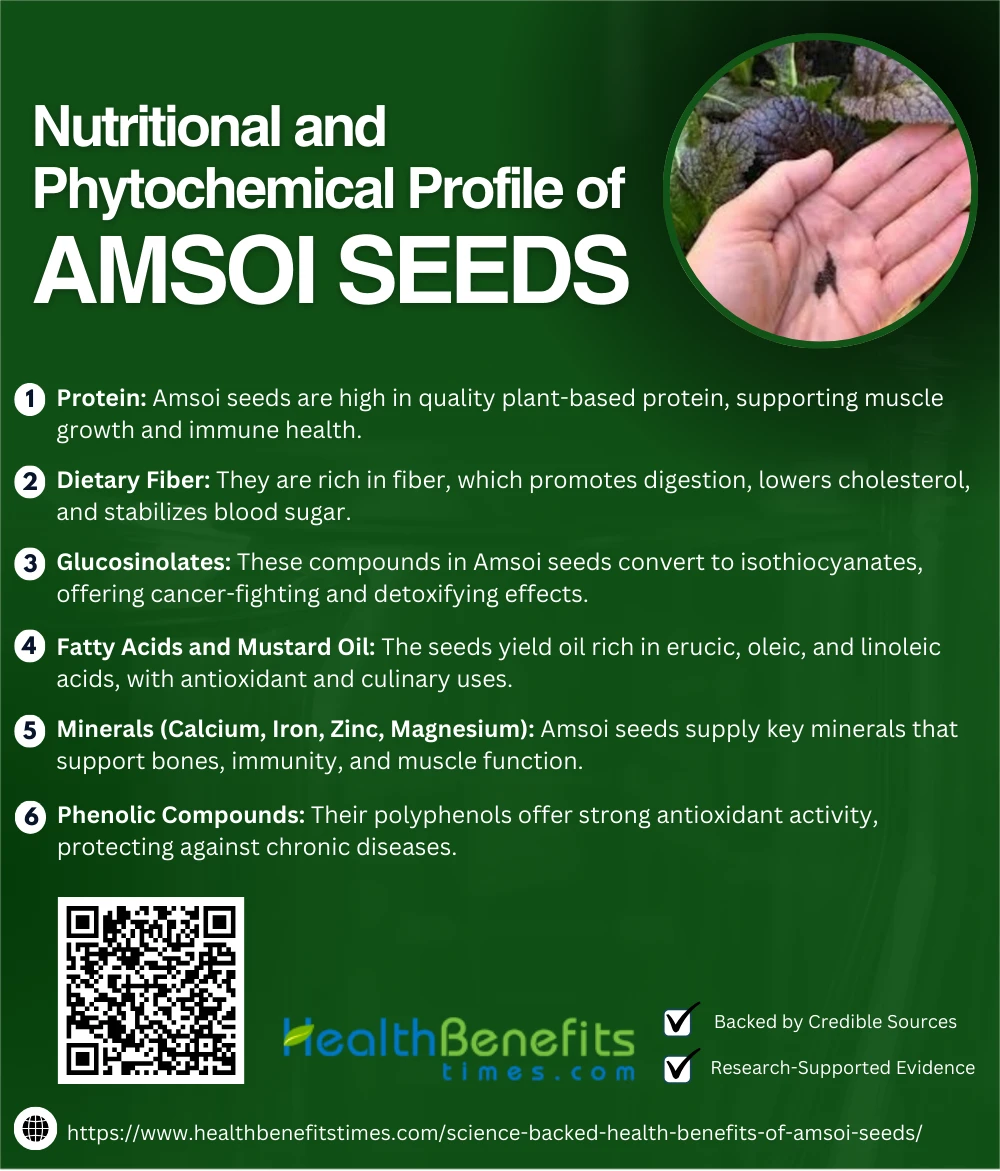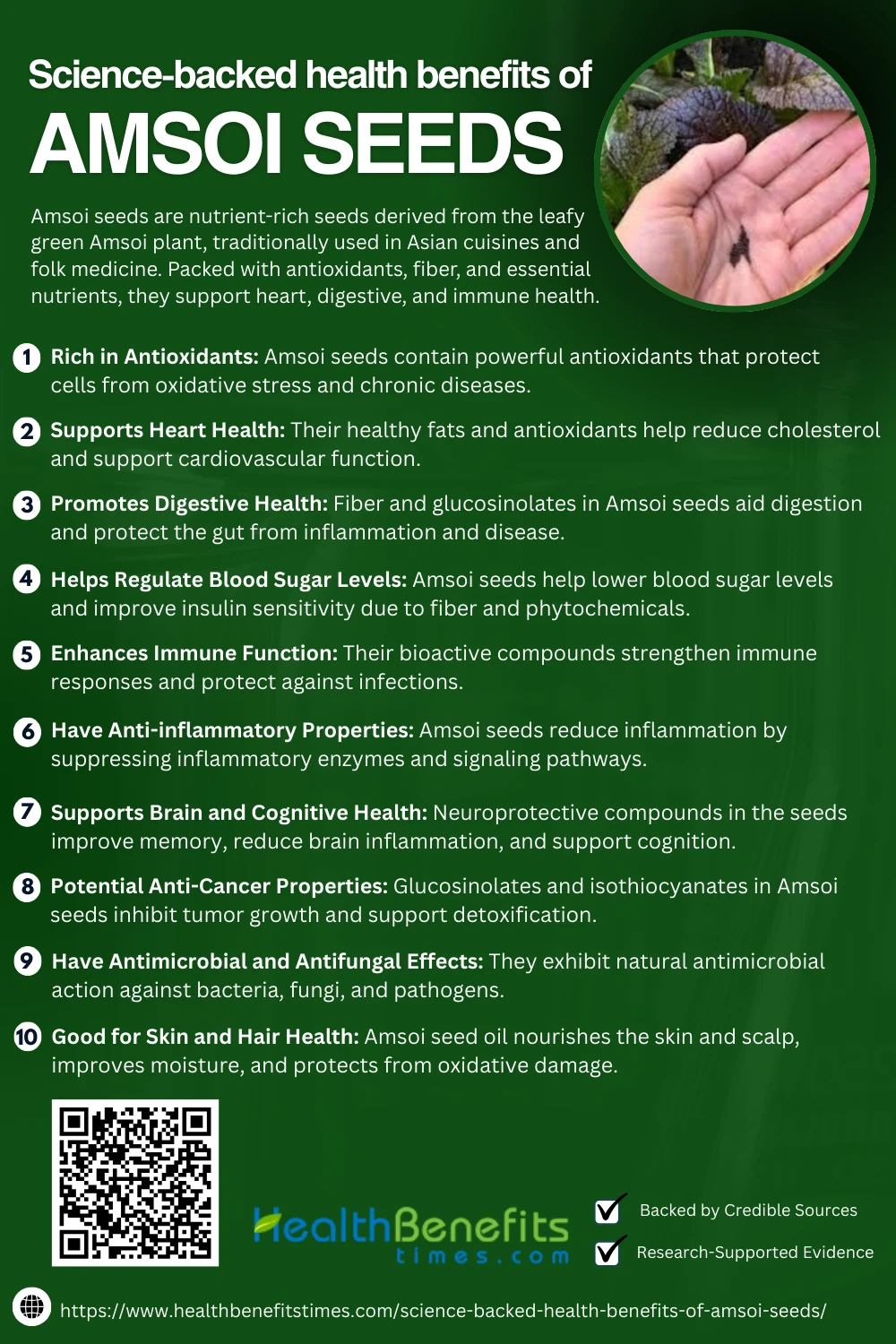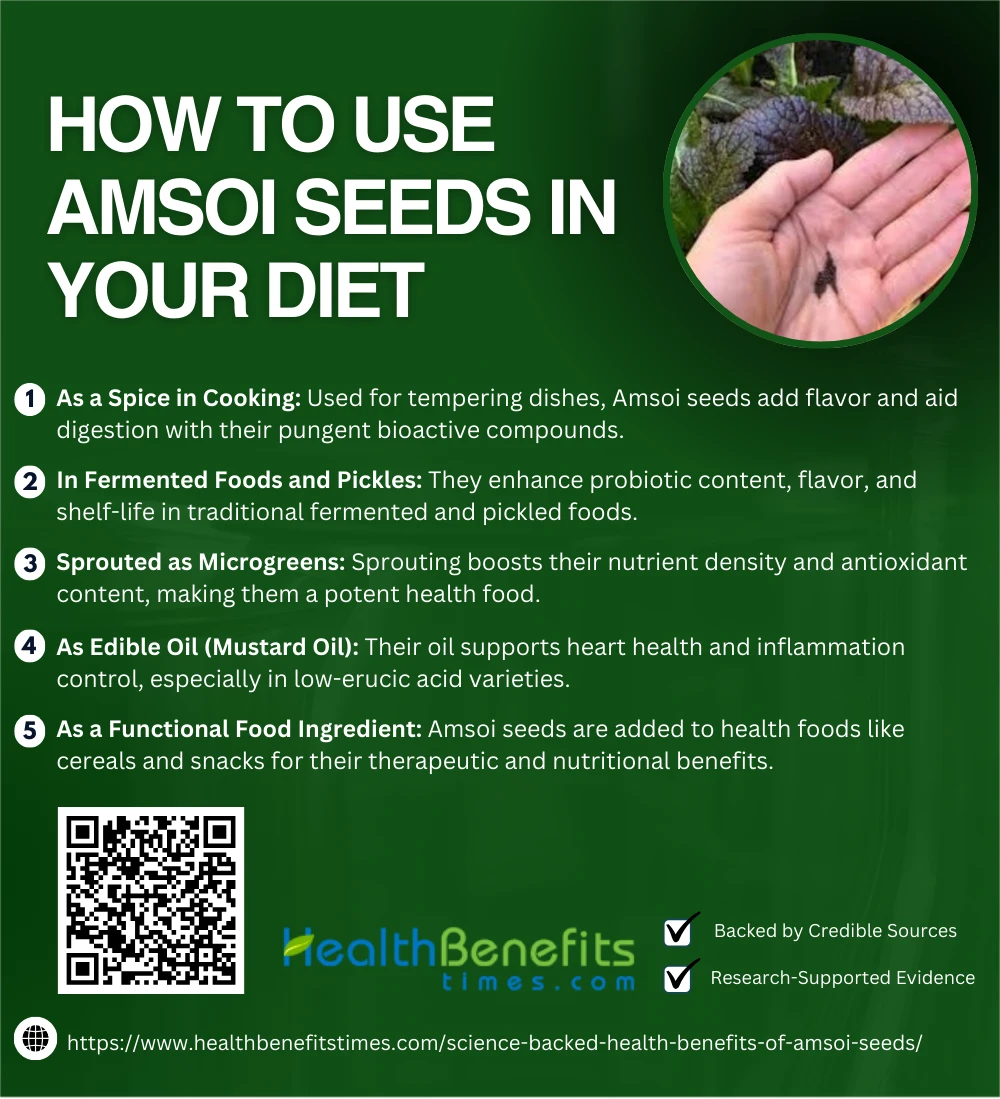- Amsoi seeds are nutrient-rich seeds derived from the leafy green Amsoi plant, traditionally used in Asian cuisines and folk medicine.
- Packed with antioxidants, fiber, and essential nutrients, they support heart, digestive, and immune health.
- Scientific studies highlight their anti-inflammatory, blood sugar-regulating, and potential neuroprotective properties.
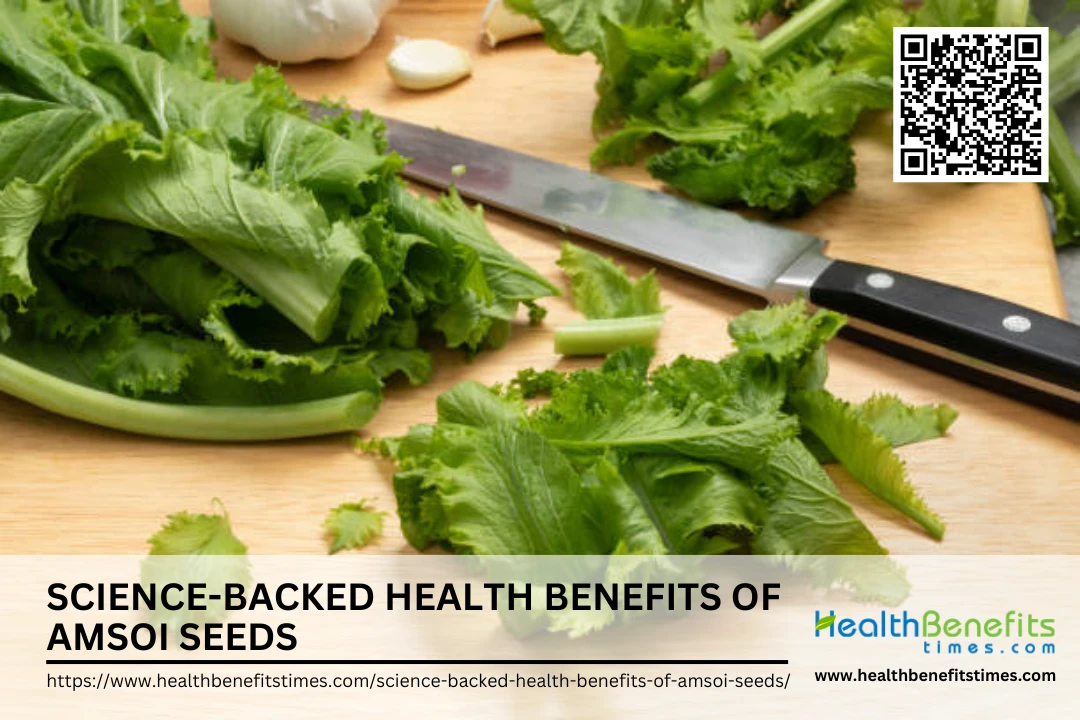 Amsoi seeds, also known as Brassica juncea seeds, are the edible seeds of Indian mustard plants, valued for their pungent flavor and rich phytochemical profile, especially glucosinolates and isothiocyanates. Amsoi seeds have garnered increasing attention in scientific research due to their multifaceted health-promoting properties. Their bioactive compounds, notably glucosinolates, have demonstrated potent anti-inflammatory, antioxidant, and antimicrobial effects, making them potential candidates for preventive nutrition and functional food development. A recent chromatographic analysis revealed a high concentration of isothiocyanates in Brassica juncea extracts, which are linked to reduced cancer risk and improved metabolic health. Furthermore, studies show that glucosinolate levels in Amsoi seeds can be optimized through processing methods such as germination and fungal elicitation, enhancing their nutraceutical potential. As evidence mounts, Amsoi seeds are emerging as a scientifically validated component of health-focused diets and alternative medicine.
Amsoi seeds, also known as Brassica juncea seeds, are the edible seeds of Indian mustard plants, valued for their pungent flavor and rich phytochemical profile, especially glucosinolates and isothiocyanates. Amsoi seeds have garnered increasing attention in scientific research due to their multifaceted health-promoting properties. Their bioactive compounds, notably glucosinolates, have demonstrated potent anti-inflammatory, antioxidant, and antimicrobial effects, making them potential candidates for preventive nutrition and functional food development. A recent chromatographic analysis revealed a high concentration of isothiocyanates in Brassica juncea extracts, which are linked to reduced cancer risk and improved metabolic health. Furthermore, studies show that glucosinolate levels in Amsoi seeds can be optimized through processing methods such as germination and fungal elicitation, enhancing their nutraceutical potential. As evidence mounts, Amsoi seeds are emerging as a scientifically validated component of health-focused diets and alternative medicine.
What Are Amsoi Seeds?
Amsoi seeds, botanically known as Brassica juncea, belong to the Brassicaceae (mustard) family. This plant species is native to South Asia and has been cultivated for centuries due to its edible seeds, leaves, and medicinal properties. As one of the earliest domesticated plants, Brassica juncea is deeply embedded in the culinary and healing traditions of India and other Asian countries. (1)
The seeds of Amsoi are small, round, and dark brown to yellowish in color. They have a distinctive pungent aroma and a spicy, slightly bitter taste, which is attributed to the high content of sinigrin, a glucosinolate compound. These sensory characteristics make Amsoi seeds a favored spice in various regional cuisines. (2)
Traditionally, Amsoi seeds have been used not only in pickling and seasoning but also in Ayurvedic and folk medicine for treating respiratory and digestive issues. They are believed to reduce kapha and improve circulation. (3)
Nutritional and Phytochemical Profile of Amsoi Seeds
Amsoi seeds are packed with essential nutrients and bioactive compounds. Their rich nutritional and phytochemical profile supports various health benefits, making them a valuable addition to a balanced diet.
Amsoi seeds are a rich source of plant-based protein, contributing significantly to daily dietary needs. The protein content can range between 28% and 32%, depending on the cultivar and growing conditions. These proteins are primarily albumins and globulins, and they include essential amino acids that support tissue repair, immune function, and muscle development. According to Sharma et al., 2019, the high-quality protein profile makes Brassica juncea seeds particularly valuable in vegetarian and vegan diets.
2. Dietary Fiber
The seeds contain considerable dietary fiber, especially in the seed coat and residual meal after oil extraction. This fiber aids in improving digestive health, reducing cholesterol levels, and stabilizing blood sugar. The insoluble component helps with bowel regularity, while the soluble fiber forms gels that trap fats and sugars. These properties make it a functional ingredient in managing metabolic conditions. (2)
3. Glucosinolates
Glucosinolates are signature phytochemicals in Brassica species, and Amsoi seeds are especially rich in them. These sulfur-containing compounds convert into bioactive isothiocyanates when the seeds are crushed or chewed, offering anti-carcinogenic, antimicrobial, and detoxifying properties. The concentration and composition of glucosinolates can be enhanced through germination and fungal elicitation (Andini et al., 2019). (4)
4. Fatty Acids and Mustard Oil
Amsoi seeds yield around 30–40% oil, predominantly consisting of erucic acid, oleic acid, and linoleic acid. This oil is known for its pungent aroma and is commonly used in cooking in South Asia. While high erucic acid levels may pose cardiovascular concerns, low-erucic acid varieties (Canola-type) are increasingly bred for safer consumption. The oil also contains sterols and tocopherols with antioxidant effects. (5)
5. Minerals (Calcium, Iron, Zinc, Magnesium)
Amsoi seeds are dense in essential minerals. Iron supports oxygen transport, zinc enhances immunity, calcium is critical for bone health, and magnesium regulates muscle and nerve functions. These micronutrients make the seeds beneficial in addressing common deficiencies, especially in developing countries. The mineral composition varies by soil quality and processing method.
6. Phenolic Compounds
Polyphenols, such as flavonoids and phenolic acids, are abundant in Amsoi seeds and contribute significantly to their antioxidant potential. These compounds scavenge free radicals, reduce oxidative stress, and protect against chronic diseases like diabetes, cancer, and neurodegeneration. The total phenolic content may vary with drying and extraction processes. (6)
Comparison with other Brassica seeds
Here is a detailed comparison table highlighting the nutritional, phytochemical, and cultural differences between Amsoi seeds (Brassica juncea) and other major Brassica seeds:
| Characteristic | Amsoi (B. juncea) | Black Mustard (B. nigra) | White Mustard (Sinapis alba) | Rapeseed (B. napus) | Turnip (B. rapa) |
| Protein Content (%) | 28 | 26 | 25 | 24 | 22 |
| Oil Content (%) | 30 | 33 | 25 | 40 | 29 |
| Glucosinolate Content (mg/g) | 85 | 95 | 60 | 50 | 40 |
| Erucic Acid (%) | 35 (high) | 25 (moderate) | 3 (low) | 1 (low, Canola-type) | 20 (moderate) |
| Antioxidants | High in polyphenols, flavonoids | Moderate flavonoids | Low polyphenols | Moderate tocopherols | Moderate polyphenols |
| Flavor Profile | Spicy, pungent | Sharp, intense | Mild, slightly sweet | Neutral, oily | Mild, earthy |
| Medicinal Uses | Anti-inflammatory, digestive aid, antimicrobial (5) | Pain relief, traditional digestive remedy | Demulcent, traditional stomachic | Cardioprotective oil use | Mild digestive tonic |
| Culinary Uses | Pickles, tempering, mustard oil | Spice blends, whole seed tempering | Pickles, salad dressings | Cooking oil (canola), margarine | Used for leaves and sometimes seed oil |
| Geographical Origin | Indian Subcontinent | Mediterranean Basin | Southern Europe | Europe, Canada | Asia, Europe |
| Seed Color | Brown to dark brown | Black | Pale yellow | Yellowish to brown | Pale brown |
| Seed Size | Small, round (~2mm) | Very small (~1-1.5mm) | Larger (~2.5-3mm) | Medium (~2mm) | Medium (~2mm) |
Science-Backed Health Benefits of Amsoi Seeds
Amsoi seeds offer a range of science-backed health benefits due to their rich antioxidant, anti-inflammatory, and nutrient content. Research highlights their potential in supporting heart, digestive, and immune health.
Amsoi seeds are packed with potent antioxidants such as flavonoids, polyphenols, and glucosinolates, which protect cells from oxidative stress. These compounds reduce free radical activity and may prevent chronic diseases like cancer and neurodegeneration. Studies highlight the antioxidant-rich profile of Brassica juncea, its glucosinolate conversion to isothiocyanates, antimicrobial isothiocyanates, and radical scavenging activity, supporting its overall therapeutic value. (5) (4) (7) (2) (6)
2. Supports Heart Health
Amsoi seeds promote cardiovascular health through their rich profile of unsaturated fatty acids and antioxidant phytochemicals. These compounds lower LDL cholesterol and protect blood vessels from oxidative damage. The mustard oil derived from Brassica juncea is high in beneficial fats and shown to reduce lipid peroxidation. (5) Studies affirm its cholesterol-modulating properties, antioxidant-mediated vasoprotection, and its potential in anti-inflammatory heart support. (4) (2) (7) (6)
3. Promotes Digestive Health
Amsoi seeds contribute to digestive wellness through their rich fiber, glucosinolates, and prebiotic activity. The fiber enhances bowel regularity, while glucosinolate breakdown products exhibit gut-protective and anti-inflammatory effects. (5) Fermented mustard seed products have shown positive microbiome modulation. (2) Additionally, glucosinolates may help prevent gastric cancers, support liver detoxification, and reduce gut inflammation. (7) (4) (6)
4. Helps Regulate Blood Sugar Levels
Amsoi seeds have demonstrated hypoglycemic properties, aiding in blood sugar regulation. In rodent models, Brassica juncea consumption reduced fasting glucose and increased hepatic glycogen storage. (8) Its fiber slows glucose absorption, supporting insulin response. (5) Glucosinolates enhance enzyme activity linked to glucose metabolism. (6) Fermentation improves its antidiabetic potential, while clinical insight affirms its dietary relevance. (4) (2)
5. Enhances Immune Function
Amsoi seeds support immune function through their potent phytochemicals, especially glucosinolates and isothiocyanates. These compounds modulate immune cell activity and reduce oxidative stress, enhancing overall immunity. (9) Flavonoids in Brassica juncea stimulate white blood cell production. (3) Antioxidant synergy also protects immune organs. (2) Mustard seed extracts are known to upregulate immune signaling pathways, reinforcing their immunoprotective potential. ({% trusted %}) (7)
6. Have Anti-inflammatory Properties
Amsoi seeds exhibit strong anti-inflammatory effects by inhibiting pro-inflammatory cytokines and enzymes like COX-2. Their bioactive compounds, particularly isothiocyanates, downregulate inflammatory signaling in immune cells. (3) Brassica juncea glucosinolates reduce systemic inflammation in animal studies. (9) These effects are enhanced by synergistic polyphenols. (2) Isothiocyanates also act on thiol-dependent redox pathways, and fungal elicitation improves anti-inflammatory potency. (7) (4)
7. Supports Brain and Cognitive Health
Amsoi seeds contain neuroprotective phytochemicals that combat oxidative stress—a major contributor to neurodegeneration. Brassica juncea extracts have shown cognitive enhancement in animal models, improving memory and learning capacity. (10) Their high flavonoid and polyunsaturated fat content aids neurotransmission and reduces brain inflammation. (9) Additional reviews emphasize their nootropic properties, antioxidative brain support, and relevance in traditional neuromedicinal systems. (6) (2) (11)
8. Potential Anti-Cancer Properties
Amsoi seeds possess bioactive compounds—like glucosinolates and isothiocyanates—that inhibit tumor growth and promote apoptosis. Brassica juncea extracts suppress cancer cell proliferation in various models, particularly for breast and colon cancers. (11) Their role in detox enzyme induction is well-documented. (9) Studies show that mustard plant constituents interrupt angiogenesis, modulate redox signaling, and enhance anticancer synergy when fermented. (10) (2) (6)
9. Have Antimicrobial and Antifungal Effects
Amsoi seeds demonstrate broad-spectrum antimicrobial activity against bacteria, fungi, and skin pathogens. Glucosinolates and isothiocyanates from Brassica juncea act as natural antimicrobial agents. (3) The seeds are effective in inhibiting fungal growth and wound-related microbes. (12) Their extracts also show antibacterial efficacy in topical applications, with essential oils used in folk medicine for infection control and antimicrobial coatings. (6) (9) (2)
10. Good for Skin and Hair Health
Amsoi seeds nourish skin and hair due to their rich oil content, antioxidants, and anti-inflammatory properties. Mustard seed oil, derived from Brassica juncea, is traditionally applied to improve scalp circulation and reduce dandruff. (3) It protects skin from oxidative damage and helps treat minor skin infections. (2) (12) The oil promotes collagen integrity and moisture retention, while fermented extracts enhance skin barrier repair. (4) (9)
How to Use Amsoi Seeds in Your Diet
Incorporating Amsoi seeds into your daily diet is easy and beneficial. These versatile seeds can be added to smoothies, baked goods, salads, or consumed as roasted snacks or powdered supplements.
Amsoi seeds are widely used for tempering curries and dals, releasing essential oils that enhance flavor and digestion. Their glucosinolate-derived pungency enriches South Asian cuisines. (5) Traditionally used in spice blends, they also have medicinal relevance and improve food shelf-life. (2) (13)
2. In Fermented Foods and Pickles
Amsoi seeds are vital in traditional fermentation and pickling for their probiotic-enhancing and flavor-boosting roles. Used in lactic acid-based preservation, they help in controlling microbial growth and enhancing nutrient bioavailability. (14) Their tangy flavor deepens with fermentation (Wacher et al., 2010) and supports gut health. (13)
3. Sprouted as Microgreens
Sprouting Amsoi seeds into microgreens enhances their levels of vitamin C, polyphenols, and glucosinolates, making them a concentrated source of bioactives. Studies confirm their superior nutritional density and antioxidant capacity compared to mature plants. (15) (16) (17)
4. As Edible Oil (Mustard Oil)
Amsoi seeds yield mustard oil, rich in monounsaturated fatty acids and phytosterols, offering heart-protective and anti-inflammatory effects. Studies report its ability to reduce LDL cholesterol and improve vascular health, with traditional and modern culinary relevance, and verified safety in low-erucic varieties. ({% trusted %}) ({% trusted %}) ({% trusted %})
5. As a Functional Food Ingredient
Amsoi seeds are increasingly recognized in functional food development due to their rich phytochemical profile. They’ve been incorporated into breadsticks and cereals for their antioxidant and anti-inflammatory properties. Genomic research supports their nutraceutical potential, while broader reviews confirm their dietary health value. (18) (2)
Who Should Avoid Amsoi Seeds?
While Amsoi seeds offer many health benefits, they may not be suitable for everyone. Individuals with seed allergies, certain medical conditions, or those on medication should consult a healthcare professional.
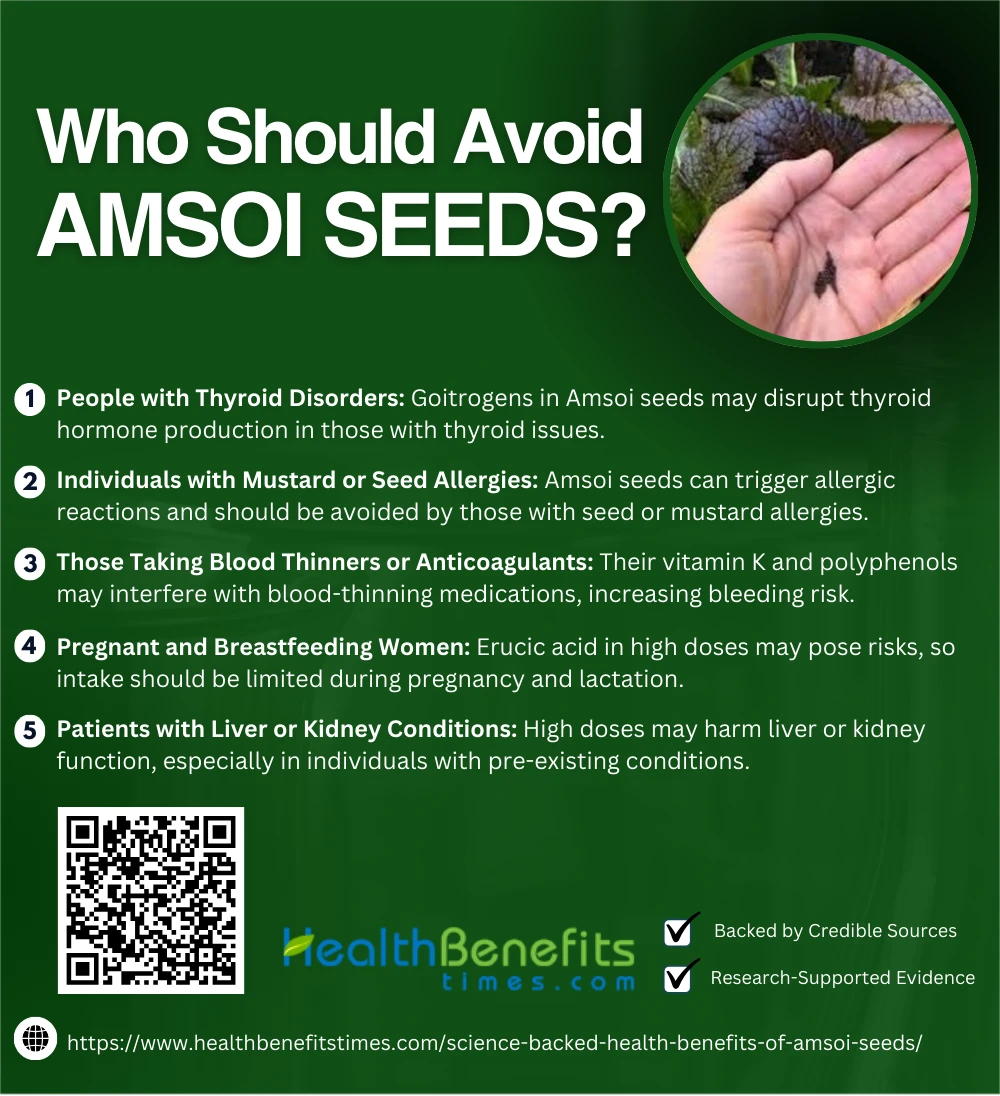 1. People with Thyroid Disorders
1. People with Thyroid Disorders
Amsoi seeds contain goitrogens—compounds that can interfere with iodine uptake—posing a risk to those with hypothyroidism. Regular intake may affect thyroid hormone production, especially when iodine levels are low. (19) (20) Cooking reduces this effect but caution is advised for sensitive individuals.
2. Individuals with Mustard or Seed Allergies
Amsoi seeds, like other mustard seeds, are classified as major allergens in some countries. Allergic reactions can range from mild rashes to anaphylaxis. (19) (20) People with known seed or mustard allergies should strictly avoid any form of ingestion or topical exposure.
3. Those Taking Blood Thinners or Anticoagulants
Due to their high vitamin K and antioxidant content, Amsoi seeds may interfere with blood-thinning medications like warfarin. The polyphenols in the seeds can also affect drug metabolism enzymes and increase bleeding risk if consumed in large amounts alongside medication. (20) (19)
4. Pregnant and Breastfeeding Women
High doses of Amsoi seed extracts or mustard oil may contain erucic acid, which could pose reproductive and developmental risks in animal studies. Until more safety data is available, consumption should be limited during pregnancy and lactation. (20) (19)
5. Patients with Liver or Kidney Conditions
Some studies suggest potential hepatotoxic and nephrotoxic effects at high doses of mustard seed extracts due to specific alkaloids and oil constituents. (20) (19) Individuals with compromised liver or kidney function should consult healthcare providers before use.
Potential Side Effects of Amsoi Seeds
Although generally safe, Amsoi seeds may cause side effects like digestive issues or allergic reactions in some individuals. Overconsumption or interactions with medications can also pose health risks.
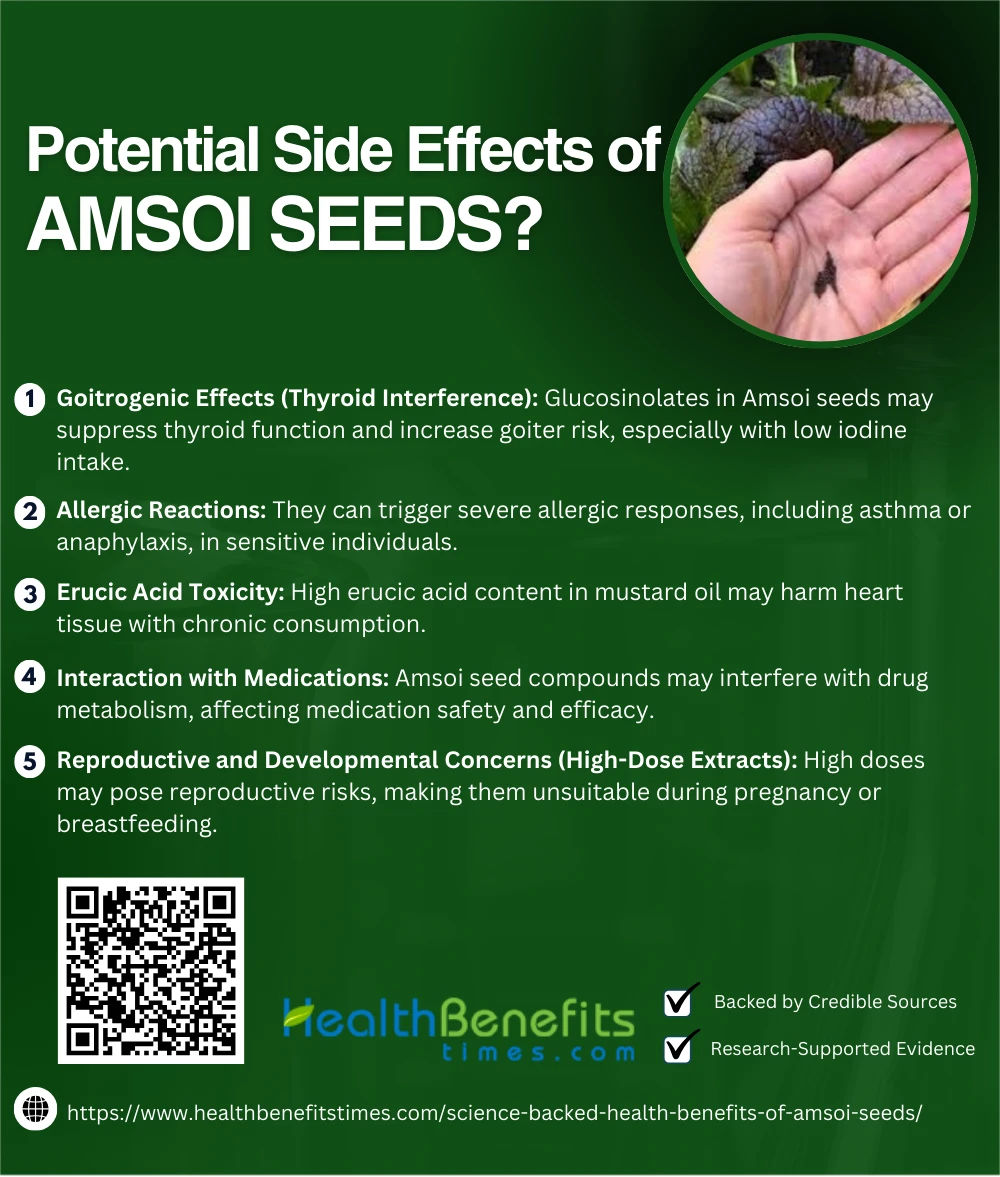 1. Goitrogenic Effects (Thyroid Interference)
1. Goitrogenic Effects (Thyroid Interference)
Amsoi seeds contain glucosinolates—goitrogenic compounds that can interfere with iodine uptake, suppressing thyroid hormone synthesis. This may elevate the risk of goiter and hypothyroidism, especially in iodine-deficient individuals. ({% trusted %}) Goitrogens persist even after processing and have been implicated in regional thyroid disorders. (21) (22)
2. Allergic Reactions
Amsoi seeds are a common allergen and may trigger serious reactions such as hives, asthma, or even anaphylaxis in sensitive individuals. Mustard proteins like Sin a 1 and Sin a 2 are well-documented allergens. (23) Mustard-induced food allergy is increasing globally and should not be underestimated. (2)
3. Erucic Acid Toxicity
Mustard oil derived from Amsoi seeds can contain high levels of erucic acid, which may lead to myocardial lipidosis in animal models. Chronic intake may affect heart tissue. Regulatory bodies recommend limiting high-erucic oils. (2) Traditional varieties often exceed safe thresholds. (22)
4. Interaction with Medications
Amsoi seeds contain phytochemicals and polyphenols that may alter liver enzyme activity, impacting drug metabolism pathways like CYP450. This may reduce the effectiveness or increase toxicity of medications such as anticoagulants or thyroid drugs. (2) Brassica bioactives may also antagonize iodine-based treatments or hormone modulators. (20)
5. Reproductive and Developmental Concerns (High-Dose Extracts)
Erucic acid in Amsoi seed oil, when consumed in high doses, has shown potential reproductive toxicity in animal studies, affecting fetal development and liver function during pregnancy. (24) (25) Brassica juncea varieties with high erucic acid should be avoided by pregnant or breastfeeding individuals.
Conclusion
Amsoi seeds are a powerful source of nutrition, offering a range of science-backed health benefits. From boosting heart and digestive health to supporting immune function and reducing inflammation, these seeds are a valuable addition to a balanced diet. Their rich antioxidant and phytochemical content make them especially beneficial for overall well-being. However, like any supplement, moderation is key, and individuals with allergies or medical conditions should consult a healthcare provider before use. With growing scientific interest and traditional support, Amsoi seeds stand out as a promising natural health booster worth considering for both preventive care and daily nourishment.


